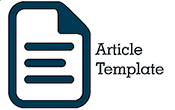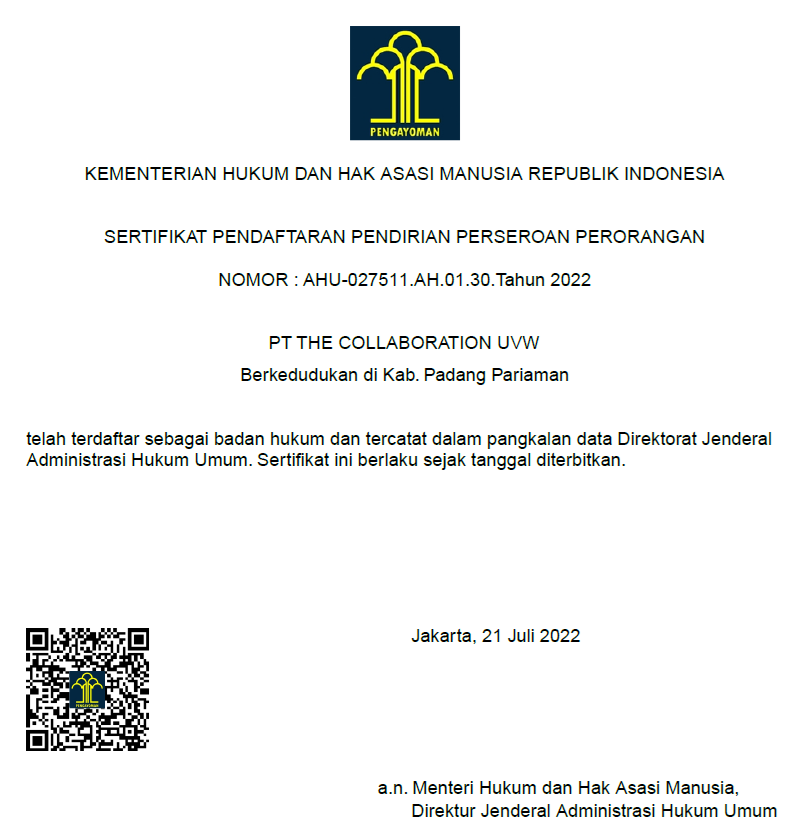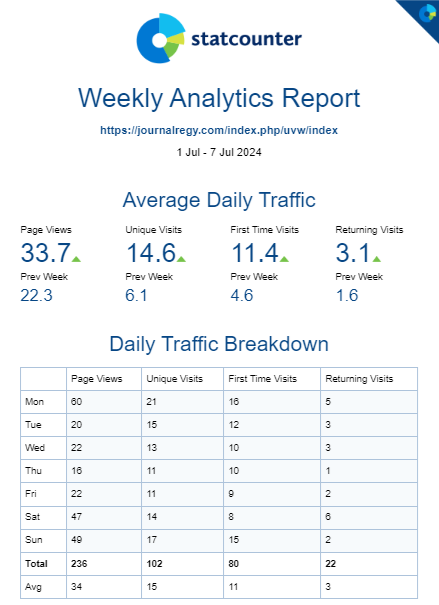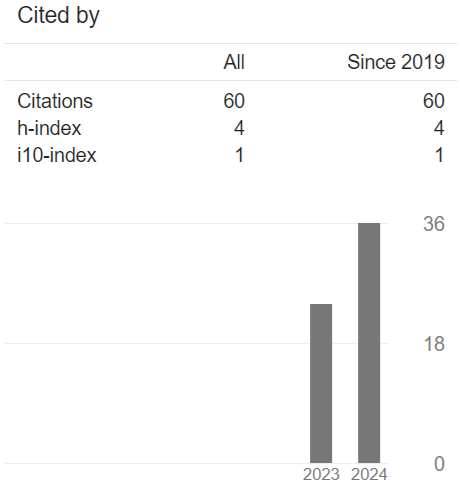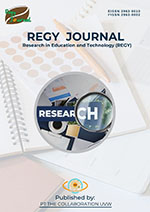The needs for developing a simple financial report template to improve student understanding of simple business financial management
DOI:
https://doi.org/10.62590/regy.v2i2.110Keywords:
teaching modules, flipbook media, learning outcomesAbstract
This research aimed to describe the development of a financial report template for economics learning at SMAN 19 Tebo. This research method was carried out using non-associative quantitative analysis. The sample consisted of 32 people from a population of 48 people. Data collection techniques through observation and questionnaires. The research results from the needs analysis showed that the indicator of interest in module templates (flipbook media) was 73% which is in the medium category. Indicator perception of learning motivation was 90% which is included in the very high category. Indicator perception of learning outcomes also showed a very high figure with 93%. Indicator perception regarding the use of module templates (flipbook media) to increase students’ understanding in learning financial reports showed a high figure with 89%. This showed that developing module templates using flipbook media can improve students’ learning understanding of financial reporting material at SMAN 19 Tebo.
References
Alannasir, W. (2020). Characteristic-based development students aspect. International Journal of Asian Education, 1(1), 29-36. https://doi.org/10.46966/ijae.v1i1.18.
Algraini, S. (2019). Education for human development: a capability perspective in Saudi public education. Compare: A Journal of Comparative and International Education, 51(3), 416-432. https://doi.org/10.1080/03057925.2019.1629275.
Ana, A., Kustiawan, I., Ahman, E., Zakaria, S., Muktiarni, M., Dwiyanti, V., Saripudin, S., & Khoerunnisa, I. (2022). Defining vocational teacher competencies in industry 4.0 from the perspective of teachers and lecturers. Journal of Engineering Education Transformations, 35(2), 39-46. https://doi.org/10.16920/jeet/2022/v35is2/22117.
Aprilutfi, D. N. (2022). Flipbook tematik: Alternatif media pembelajaran PKN berbasis Fliphtml5 di SD. Educenter: Jurnal Ilmiah Pendidikan, 1(9), 650-655. https://doi.org/10.55904/educenter.v1i9.111.
Arpan, M., & Budiman, R. D. A. (2018). Media pembelajaran pengenalan hardware jaringan komputer berbasis augmented reality. Pontianak: Program Studi Pendidikan Fisika IKIP PGRI Pontianak.
Arpan, M., Ambiyar, A., & Rizal, F. (2022). Konsep project and peer tutoring-based learning pada pembelajaran abad 21. Sukoharjo: Tahta Media.
Batey, M., & Furnham, A. (2006). Creativity, intelligence, and personality: A critical review of the scattered literature. Genetic, Social, and General Psychology Monographs, 132(4), 355-429. https://doi.org/10.3200/MONO.132.4.355-430.
Batubara, Q. N. M. (2023). ICT-based needs analysis of learning arts and culture in middle school at Sunggal. Research in Education and Technology (REGY), 2(1), 38-41. https://doi.org/10.62590/regy.v2i1.96.
Botezat, A., & Pfeiffer, F. (2019). The impact of parental labour migration on left-behind children’s educational and psychosocial outcomes: Evidence from Romania. Population, Space and Place, 26(2), 2277. https://doi.org/10.1002/psp.2277.
Budiman, R. D. A., Liwayanti, U., & Arpan, M. (2022). Analisis kebutuhan dan kesiapan penerapan media pembelajaran berbasis Android materi Ilmu Akidah. EDUMATIC: Jurnal Pendidikan Informatika, 6(1), 31-38. https://doi.org/10.29408/edumatic.v6i1.5087.
Chankseliani, M., Qoraboyev, I., & Gimranova, D. (2021). Higher education contributing to local, national, and global development: New empirical and conceptual insights. Higher Education, 81(June), 109-127. https://doi.org/10.1007/s10734-020-00565-8.
Dewi, M. (2018). Need analysis pengembangan model pembelajaran berbasis proyek e commerce pada mata kuliah Kewirausahaan. Jurnal Pendidikan dan Teknologi Informasi, 5(1), 71-80.
Dewi, M., Radyuli, P., Febriana, N., Eliza, E. (2020). Pengaruh kemampuan manusia abad 21 dengan pembentukan karakter wirausaha mahasiswa Universitas Putra Indonesia YPTK Padang. Jurnal Benefita, 5(3), 468-478.
Dou, X. (2024). Can free-view media processing technology improve classroom performance? Technology, Pedagogy and Education, 33(4), 421-435. https://doi.org/10.1080/1475939X.2024.2342328.
Feladi, V., Arpan, M., & Verawardina, U. (2017). Pelatihan pembuatan media pembelajaran berbasis animasi di SMP Negeri 2 Siantan Kabupaten Mempawah. Gervasi: Jurnal Pengabdian kepada Masyarakat, 1(1), 32-42. https://doi.org/10.31571/gervasi.v1i1.597.
Friedman, J., York, H., Graetz, N., Woyczynski, L,. Whisnant, J., Hay, S. I., & Gakidou, E. (2020). Measuring and forecasting progress towards the education-related SDG targets. Nature, 580(April), 636-639. https://doi.org/10.1038/s41586-020-2198-8.
Goodwin, A. L. (2019). Globalization, global mindsets and teacher education. Action in Teacher Education, 42(1), 6-18. https://doi.org/10.1080/01626620.2019.1700848.
Hashmi, A., Carrara, V. I., Nyein, P. B., Darakamon, M. C., Charunwatthana, P., & McGready, R. (2019). The healthy baby flipbook: Piloting home-based counseling for refugee mothers to improve infant feeding and water, sanitation, and hygiene (WASH) practices. Global Health Action, 12(1), 1560115. https://doi.org/10.1080/16549716.2018.1560115.
Heleta, S., & Bagus, T. (2021). Sustainable development goals and higher education: Leaving many behind. High Education, 81(June), 163-177. https://doi.org/10.1007/s10734-020-00573-8.
Hernando, F., Basri, I. Y., Alwi, E., & Purwanto, W. (2022). Pembuatan video pembelajaran praktikum pada mata pelajaran Listrik Elektronika. Research in Education and Technology (REGY), 1(1), 68-75. https://doi.org/10.62590/regy.v1i1.73.
Jaedun, A., Nurtanto, M., Mutohhari, F., Saputro, I. N., & Kholifah, N. (2024). Perceptions of vocational school students and teachers on the development of interpersonal skills towards Industry 5.0. Cogent Education, 11(1). 2375184. https://doi.org/10.1080/2331186X.2024.2375184.
Jahantab, Z. (2021). Role of education in national development. Pakistan Journal of Applied Social Sciences, 12(1), 87-108. https://doi.org/10.46568/pjass.v12i1.543.
Kopnina, H. (2020). Education for the future? Critical evaluation of education for sustainable development goals. The Journal of Environmental Education, 51(4), 280-291. https://doi.org/10.1080/00958964.2019.1710444.
Lakapu, P. A., Djara, J. I., Lakapu, D. E., & Nifus, D. A. (2023). The application of flip book media to increasing elementary children’s learning interest. International Journal of Educational Sciences and Development, 1(1), 22-29. https://doi.org/10.54099/ijesd.v1i1.671.
Lesmana, C., Arpan, M., Ambiyar, A., Wakhinuddin, W., & Fatmawati, E. (2019). Respons mahasiswa terhadap pelaksanaan program matrikulasi. Edukasi: Jurnal Pendidikan, 17(2), 227-237. http://dx.doi.org/10.31571/edukasi.v17i2.1528.
Lestari, I. K. (2013). Pengembangan bahan ajar berbasis kompetensi. Padang: Akademia Permata.
Liu, H.-Y., Chang, C.-C., Wang, I.-T., & Chao, S.-Y. (2020). The association between creativity, creative components of personality, and innovation among Taiwanese nursing students. Thinking Skills and Creativity, 35(March), 100629. https://doi.org/10.1016/j.tsc.2020.100629.
Mahasneh, A. M., Shammout, N. A., Alkhazaleh, Z. M., Al-Alwan, A. F., & Abu-Eita, J. D. (2015). The relationship between spiritual intelligence and personality traits among Jordanian university students. Psychology Research and Behavior Management, 8(March), 89-97. https://doi.org/10.2147/PRBM.S76352.
Maryunis, A. (2000). Strategi Peningkatan Kualitas Pendidikan MIPA di LPTK. Prosiding Seminar Nasional Pendidikan MIPA di Era Globalisasi di Yogyakarta.
Meisarah, F., Rohman, S., Norrahman, R. A., Rachman, R. S., & Hasim, H. (2023). Analysis of the effectiveness of digital flipbook teaching materials usage based on realistic education to improve students’ communication ability. Jurnal Scientia, 12(04), 233-239. https://doi.org/10.58471/scientia.v12i04.1948.
Muna, N., Khasanah, M., & Anbiya, B. F. (2023). Analisis pemanfaatan e-learning Walisongo dalam mata kuliah Pendidikan Kewarganegaraan. Research in Education and Technology (REGY), 1(2), 85-91. https://doi.org/10.62590/regy.v1i2.85.
Nasution, A., Ambiyar, Refdinal, Arpan, M., & Putri, E. (2024). POGIL learning model—metaphorming for mobile-based cryptography creation. International Journal of Interactive Mobile Technologies (iJIM), 18(11), 146-159. https://doi.org/10.3991/ijim.v18i11.49057.
Nkengbeza, D., Mbuzi, D., & Chainda, A. (2022). Challenges faced by primary school english teachers in integrating media technology in the teaching and learning of English. Creative Education, 13(4), 1139-1153. https://doi.org/10.4236/ce.2022.134071.
Noori, A. Q., Orfan, S. N., Akramy, S. A., Hashemi, A., & Feng, G. C. (2022). The use of social media in EFL learning and teaching in higher education of Afghanistan. Cogent Social Sciences, 8(1), 2027613. https://doi.org/10.1080/23311886.2022.2027613.
Nuha, U., Wahyuni, S., Budiarso, A., Hasanah, U., & Anggraini, N. (2021). The effectiveness of flipbook and video to improve students’ critical thinking skills in science learning during the covid-19 pandemic. Lensa: Jurnal Kependidikan Fisika, 9(1), 32-37. https://doi.org/10.33394/j-lkf.v9i1.3899.
Nurokhim, N., & Mutiara, D. (2022). Teacher competence in industrial revolution era 4.0. The Social Perspective Journal, 1(4), 259-266. https://doi.org/10.53947/tspj.v1i4.278.
Potter, J. (2018). Problematising learning in the age of data ‘acquisition’: issues in research, teaching and learning with digital media and technology. Learning, Media and Technology, 43(2), 117-118. https://doi.org/10.1080/17439884.2018.1472608.
Prayudi, R. A., Hakiki, A. K., Putra, N. R. D., Anzka, T. O., & Ihsan, M. T. (2021). The use of technology in english teaching & learning process. Jurnal Riset dan Inovasi Pembelajaran, 1(2), 102-111. https://doi.org/10.51574/jrip.v1i2.38.
Putra, A., Sidiq, F., & Mahlianurrahman, M. (2023). Development of flipbook-based teaching materials for learning in elementary schools. Jurnal Penelitian Pendidikan IPA, 9(9), 7651-7657. https://doi.org/10.29303/jppipa.v9i9.5141
Rahmiati, R., Putri, M., Engkizar, E., & Mokhtar, M. (2023). The effectiveness of flipbook-based e-modules in increasing student creativity in nail art subject in higher education. Jurnal Pendidikan Vokasi, 13(2), 167-177. https://doi.org/10.21831/jpv.v13i2.54330.
Reynolds, E. (2020). Outcome-oriented educational tasks with flipbooks. Chance, 33(4), 62-64. https://doi.org/10.1080/09332480.2020.1847963.
Setianingrum, D., Ula, E., Pratiwi, S., & Jumadi, J. (2022). Development of LKPD with a contextual approach based on flipbook to increase science learning motivation. Jurnal Pendidikan Sains Indonesia, 10(4), 833-848. https://doi.org/10.24815/jpsi.v10i4.26098
Sholihah, K., Anbiya, B. F., & Qonita, D. U. (2023). Online learning: Tantangan dan peluang pasca pandemi covid-19. Research in Education and Technology (REGY), 1(2), 111-117. https://doi.org/10.62590/regy.v1i2.84.
Sickel, J. L. (2019). The great media debate and TPACK: A multidisciplinary examination of the role of technology in teaching and learning. Journal of Research on Technology in Education, 51(2), 152-165. https://doi.org/10.1080/15391523.2018.1564895.
Sii, P., Verawardina, U., Arpan, M., & Sulistiyarini, D. (2017). Penerapan model pembelajaran inkuiri pada mata pelajaran KKPI terhadap kemampuan psikomotorik siswa. Jurnal Pendidikan Informatika dan Sains, 6(2), 166-176. http://dx.doi.org/10.31571/saintek.v6i2.642
Sulistiyarini, D., Bibi, S., Fatmawati, E., & Arpan, M. (2018). Pelatihan pembuatan media pembelajaran interaktif di SMP dan SMK Mandiri Pontianak. Gervasi: Jurnal Pengabdian kepada Masyarakat, 2(1), 39-46. https://doi.org/10.31571/gervasi.v2i1.811.
Supardi, S., Putra, R. K., Iqbal, M., & Toni, K. (2023). Development of mobile AR applications as a science learning media in increasing junior high school students’ interest in learning. Research in Education and Technology (REGY), 2(1), 1-5. https://doi.org/10.62590/regy.v2i1.93.
Syaifullah, L., Ambiyar, A., Zaus, M. A., & Arpan, M. (2024). Efektivitas pendekatan blended learning berbantuan e-learning terhadap hasil belajar mahasiswa. Juwara Jurnal Wawasan dan Aksara, 4(1), 1-12. https://doi.org/10.58740/juwara.v4i1.73.
Tortorella, G., Cauchick Miguel, P. A., Frazzon, E., Portioli-Staudacher, A., & Kumar, M. (2022). Teaching and learning of industry 4.0: expectations, drivers, and barriers from a knowledge management perspective. Knowledge Management Research & Practice, 21(4), 876-891. https://doi.org/10.1080/14778238.2022.2088418.
Undang-Undang Republik Indonesia Nomor 20 Tahun 2003 tentang Sistem Pendidikan Nasional. Lembaran Negara Republik Indonesia Tahun 2003 Nomor 78. Jakarta: Sekretariat Negara.
Wicagsono, M. A, Al-Nil, B. M. A. M. H., & Muthoifin, M. (2023). Strategies for improving teacher pedagogic competence industrial revolution era 4.0. Multicultural Islamic Education Review, 1(1), 15-25. https://doi.org/10.23917/mier.v1i1.2816.
Yuyun, S., Harjono, A., & Gunada, I. W. (2022). Developing flipbook-based physics e-module to increase students’ learning outcome and motivation. Jurnal Pendidikan Fisika dan Teknologi, 8(2), 163-175. https://doi.org/10.29303/jpft.v8i2.4292.
Downloads
Published
How to Cite
Issue
Section
License
Copyright (c) 2024 Sulastri

This work is licensed under a Creative Commons Attribution-ShareAlike 4.0 International License.


